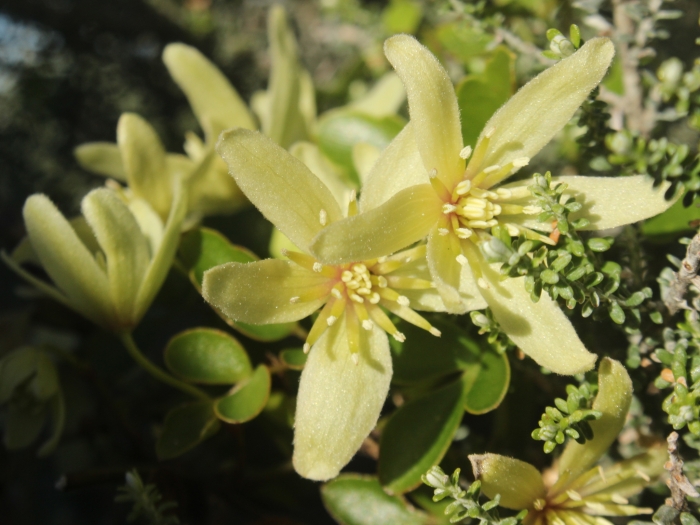Forster’s Clematis
(Clematis forsteri)
Forster’s Clematis (Clematis forsteri)
/
/

Joe Dillon
CC BY 4.0
Image By:
Joe Dillon
Recorded By:
Copyright:
CC BY 4.0
Copyright Notice:
Photo by: Joe Dillon | License Type: CC BY 4.0 | License URL: http://creativecommons.org/licenses/by/4.0/ | Rights Holder: Joe Dillon | Publisher: iNaturalist | Date Created: 2023-10-23T16:38:15-07:00 |























Estimated Native Range
Summary
Clematis forsteri, commonly known as Forster’s Clematis or New Zealand Clematis, is a perennial vine that is endemic to New Zealand, specifically thriving in coastal and lowland forests, as well as along stream margins. It exhibits a moderate growth rate and can reach heights of 4-16 feet (1.2-4.9 meters) with a similar spread of 2-16 feet (0.6-4.9 meters). This species is characterized by its twining stems and attractive foliage, which provides a lush backdrop for its large, white, and notably showy flowers that bloom profusely in the spring and summer months.
Forster’s Clematis is valued for its ornamental flowers, which can enhance garden trellises, arbors, and walls, making it a popular choice for vertical interest in landscapes. It is also used for naturalizing in suitable climates. While it can tolerate a range of soil types, including clay, loam, and sandy soils, it prefers those with medium drainage and thrives with low to medium water requirements. Partial shade is ideal, especially in hotter climates, to protect the foliage and flowers from intense sun. Gardeners should be aware that Clematis species can be susceptible to Clematis wilt, a fungal disease that causes sudden wilting and death of stems. Regular pruning can help maintain vigor and shape, and it is recommended to prune after flowering to encourage new growth.CC BY-SA 4.0
Forster’s Clematis is valued for its ornamental flowers, which can enhance garden trellises, arbors, and walls, making it a popular choice for vertical interest in landscapes. It is also used for naturalizing in suitable climates. While it can tolerate a range of soil types, including clay, loam, and sandy soils, it prefers those with medium drainage and thrives with low to medium water requirements. Partial shade is ideal, especially in hotter climates, to protect the foliage and flowers from intense sun. Gardeners should be aware that Clematis species can be susceptible to Clematis wilt, a fungal disease that causes sudden wilting and death of stems. Regular pruning can help maintain vigor and shape, and it is recommended to prune after flowering to encourage new growth.CC BY-SA 4.0
Plant Description
- Plant Type: Vine
- Height: 4-16 feet
- Width: 2-16 feet
- Growth Rate: Moderate
- Flower Color: Cream, Yellow
- Flowering Season: Spring
- Leaf Retention: Deciduous
Growth Requirements
- Sun: Full Sun, Part Shade
- Water: Medium
- Drainage: Medium
Common Uses
Bird Garden, Border Plant, Butterfly Garden, Hummingbird Garden, Low Maintenance, Showy Flowers
Natural Habitat
Endemic to coastal and lowland forests and stream margins in New Zealand
Other Names
Common Names: New Zealand Clematis
Scientific Names: , Clematis forsteri, Clematis australis, Clematis australis var. rutifolia, Clematis colensoi, Clematis colensoi var. rutifolia, Clematis hexapetala, Clematis hexapetala subsp. colensoi, Clematis hexasepala, Clematis hexasepala
GBIF Accepted Name: